![]()
|
James
Macintyre
& Co Ltd |
Location and period of operation:
|
Macintyre
(& Co) (Ltd) |
Burslem |
1854
|
1966+ |
|
China and Earthenware manufacturer at the Washington Works, Burslem, Stoke-on-Trent, England
|
Previously: W S Kennedy & Co
Also see: William Moorcroft
The London Gazette
16 July 1880
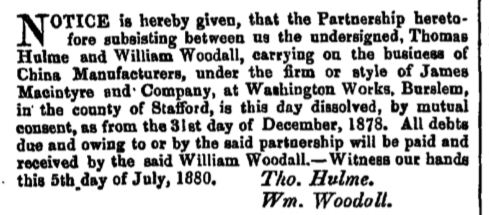
notice
of the dissolution of the partnership between
Thomas Hulme and William Woodall on 31st December 1878
Washington Works "In 1852 Mr. Kennedy was joined in partnership by his brother-in-law, Mr. James Macintyre, who shortly afterwards became sole proprietor of the works.
In 1863, Mr. Macintyre patented methods of producing oval, reeded, octagon, and other forms, by the lathe; and he was ever alert to devise and apply improvements in mechanism, &c. He succeeded in the production of a rich cream-coloured body, which, under the name of "Ivory China," has held in. high reputation, and will always be honourably associated with the "Washington" Works.
In 1867 Mr. Macintyre produced backs for hair-brushes, hand-mirrors, &c., which were patented by Mr. J. J. Hicks, and in numerous other instances, especially for France, the "body" has been used as an ivory substitute.
So far as can be ascertained, the successful application to door furniture of the earlier invention of the beautiful black, which is produced by dipping the brownish red bisque in a rich cobalt glaze, also originated at these works. This "jet," produced in great perfection,
has been applied in plain, and also with richly gilt and enamelled ornamentation, not only to door furniture, but more recently to ink-stands and similar goods.Mr. Macintyre, who was a man of public spirit and great enterprise, was much beloved by his workpeople, and the annual festive gatherings in which he, his family and friends, met his employees, obtained a well-merited celebrity.
He died in December, 1868, having a few years previously taken into partnership his confidential (commercial?) manager, Mr. Thomas Hulme, and his son-in-law, Mr. William Woodall. By these two gentlemen the business is still carried on under the old title of "James Macintyre and Co."
'Ceramic Art of Great Britain' - Llewellyn Jewitt - 1878
Macintyre & Moorcroft:
In 1897 Macintyre & Co. Ltd employed William Moorcroft as a designer, and within a year he was put in full charge of the company's art pottery studio as Chief Designer.
Moorcroft's first innovative range of pottery, called Florian Ware, was a great success and won him a gold medal at the St. Louis International Exhibition in 1904. Unusually at that time, he adopted the practice of signing his name, or his initials, on nearly all the pottery he designed, the production of which he personally oversaw.
In due course the extent to which his success had overshadowed Macintyre's other manufacturing activities resulted in resentment on the part of his employers, culminating in their decision in 1912 to close down his studio. He then set up his own company and the following year production of his pottery was transferred to a brand new factory nearby.
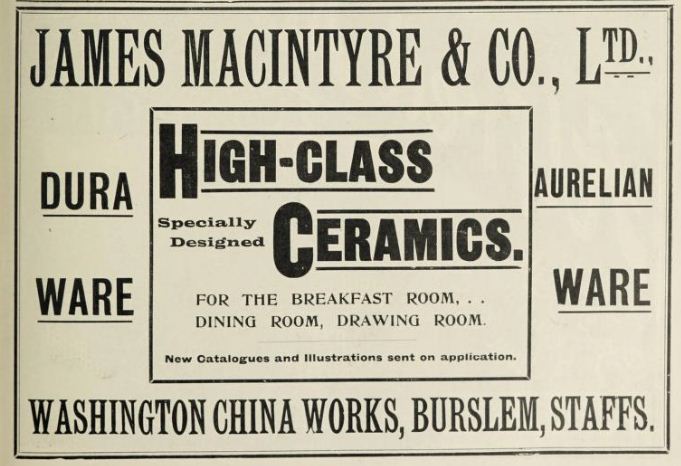
James Macintyre & Co Ltd
High Class
Specially Designed Ceramics
for the Breakfast Room,.. Dining Room, Drawing Room
Dura Ware
Aurelian Ware
Washington China Works, Burslem, Staffs
The Pottery Gazette - January 1906
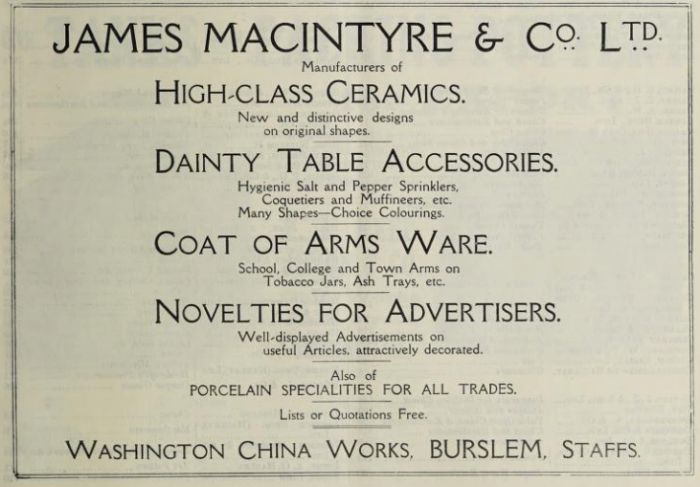
James Macintyre & Co Ltd
High Class Ceramics
Dainty Table Accessories
Coat of Arms Ware
Novelties for Advertisers
also of
Porcelain Specialities for all Trades
Washington China Works, Burslem, Staffs
The Pottery Gazette - 1st January 1913

Waterloo Road / Macintyre
Street
Macintyre,
Jas., & Co Ltd.,
Gesso, Florian, Aurelian ware and china manufacturers,
Washington Works
from..... 1907
Staffordshire Sentinel
'Business Reference Guide to The Potteries, Newcastle & District'
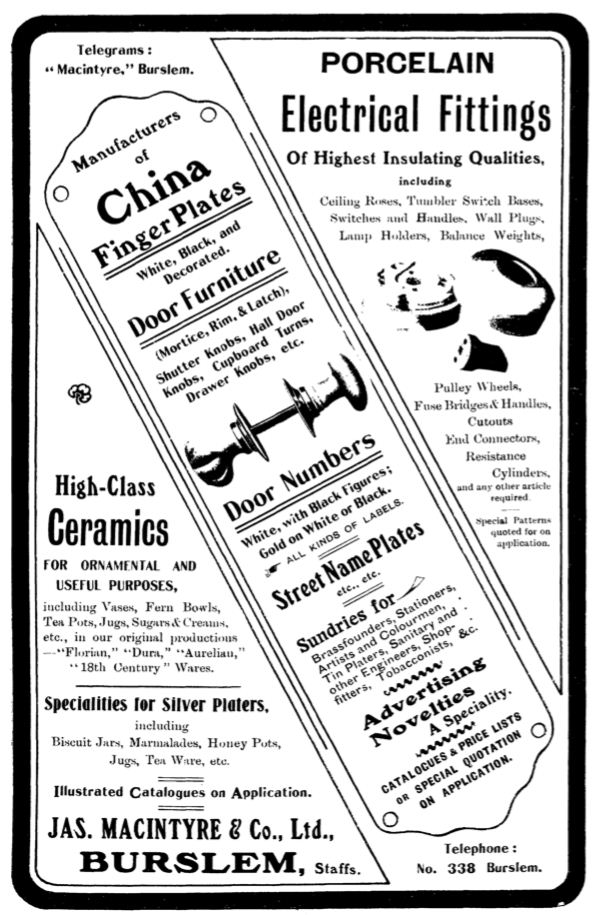
1907 advert for James Macintyre
& Co. Ltd.
from..... 1907
Staffordshire Sentinel
'Business Reference Guide to The Potteries, Newcastle & District'
|
"James Macintyre & Co., Ltd., Washington China Works, Burslem, are extensive manufacturers of a number of specialities in pottery, one of their many departments being devoted exclusively to the production of electrical accessories. This is a very interesting branch of pottery, but one with which glass and china dealers are not directly associated. To our readers Messrs. Macintyre & Co., are better known as manufacturers of specially designed high class ceramics, and even in this capacity many persons are better acquainted with their purely ornamental then their useful productions. Those who go down to the Potteries will do well to call at the works in the Waterloo-road. I called their recently, and had an instructive interview with their Mr. William Moorcroft, who is responsible for the marvellous development of the artistic features of the company's productions. He is a potter with a strong artistic individuality, and he most unmistakably impresses that individuality on every piece of ware produced by his company. Mr. Moorcroft is director of the Art section of Messrs. Macintyre's works, and, as I have before explained in the Pottery Gazette, not only are the graceful and beautiful forms produced from his own designs, but the added ornamentations are in accordance with his original conceptions. What I mean is that the finished piece we see - whether a vase or a teapot - is just what the artist-potter in the beginning intended it to be. The end has been steadily kept in view from the commencement, and this explains the perfect harmony between form and decoration, which is observable in every piece. Each design is the work of Mr. Moorcroft's own hands. The ornamental detail is carried out in accordance with his instructions by artists who work under his supervision, and he passes each piece before it is fired. On a former visit I described in detail the graceful and beautiful "Florian Ware," which is now known and admired wherever art pottery is appreciated. On this occasion I had an opportunity of inspecting the company's table ware sundries in the now popular "Dura" ware and "Aurelian" ware in the company of their originator, Mr. Moorcroft. There are teapots and stands, cream-jugs, sugar-basins, teacups and saucers, marmalade and biscuit jars, jugs, coffee-pots, and chocolate-jugs in both these wares and in a number of registered designs. Each decoration was designed expressly to suit the shape to which is is applied. In the "Dura" ware the decoration is executed entirely under the glaze, so that the rich and luminous finished effect remains uninfluenced by atmospheric conditions. In the "Aurelian" ware the decoration is also executed under the glaze, and is richly embellished in burnished gold. In common with all true artists, Mr. Moorcroft thinks artistic beauty should be combined with utility. The presence of beautiful ware on a breakfast table cannot fail to have a refining influence on those who use it. There is no reason why artistic beauty should not be found in even cheap goods. People who cannot say off-hand what art is recognise it when they see it. It has that indescribable something that makes for harmony and elicits admiration. In the purely ornamental branch of the works Mr. Moorcroft showed me several new creations of his restless genius. The chief characteristic of his decorative schemes is simplicity. This simplicity in outline and in added ornament is exactly antithetic to what is called the "New Art." In the most recent of his productions the artist has not depended upon his pencil of his graver for his added ornament."
|
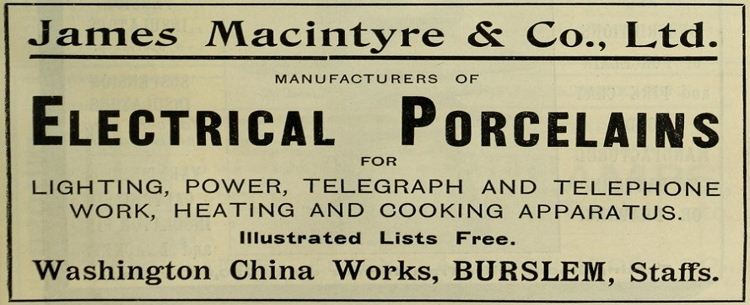
1914 advert for James Macintyre
& Co Ltd
Manufacturers of
Electrical Porcelains
Washington China Works, Burslem, Staffs
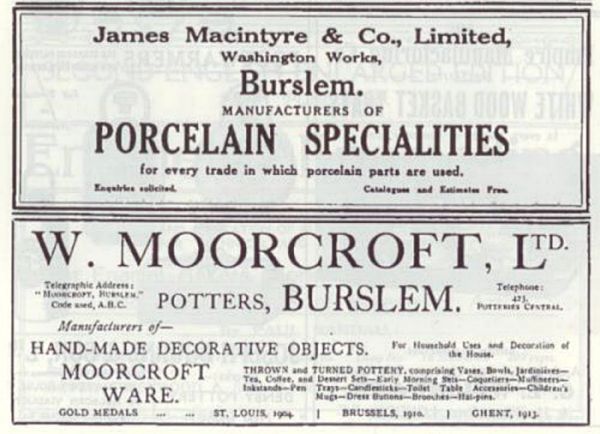
The Pottery Gazette Diary 1917
page 42 from the Pottery Gazette
showing adverts for both
James Macintyre and William Moorcroft - this was after the two parted
company in 1912 and Moorcroft started his own business in 1913
The Times
18 July 1966
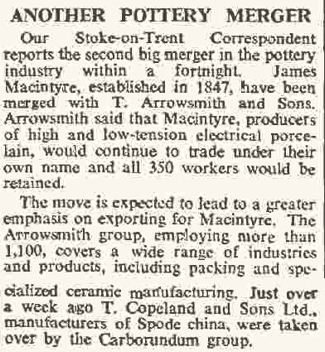
notice
of the merger of James Macintyre with
T. Arrowsmith and Sons
Industrial ceramics
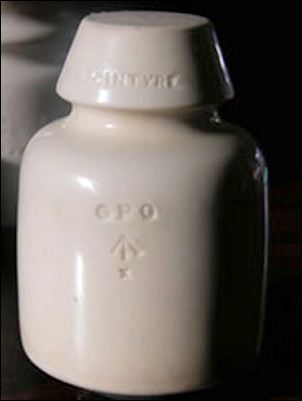
small
electrical insulator - impressed marks
Macintyre and GPO
(GPO - General Post Office, UK
telecommunications carrier)
photo: Teleramics
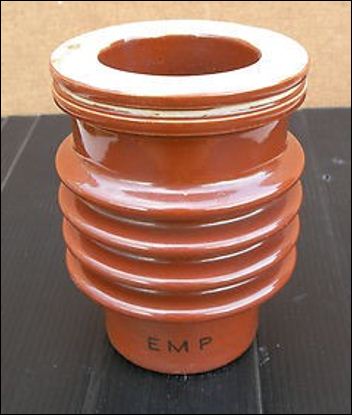
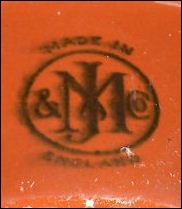
small electrical insulator (120mm high)
J
M & Co
Made in England
Crested ware
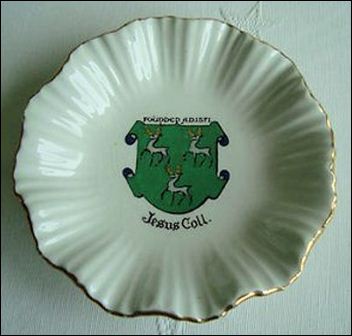 Pin dish Jesus College crest |
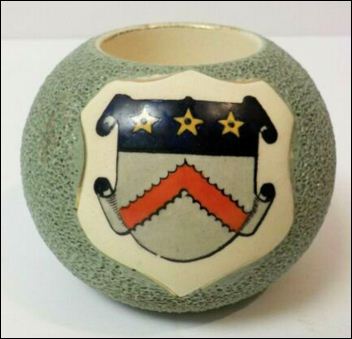 Match holder / striker Keble College crest |
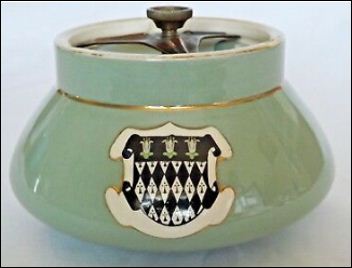 Tobacco Jar Magdalen College crest |
examples
of crested ware bearing the crests of Oxford University Colleges
produced for W. E. Andrews, Oxford
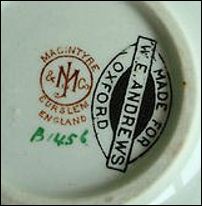
J
M & Co
Macintyre
Burslem
England
Made for W. E. Andrews Oxford
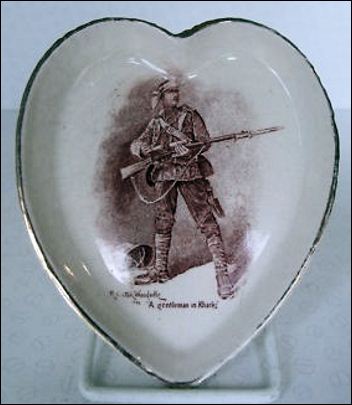 "A Gentleman in Khaki" |
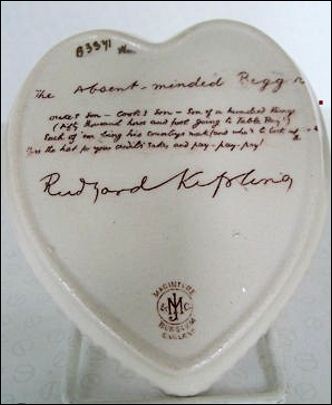 The Absent-Minded Beggar |
|
"The Absent-Minded Beggar" is a poem written by Rudyard Kipling in September 1899. It was set to music by Sir Arthur Sullivan and often accompanied by an illustration of a wounded but defiant British soldier. The song was written as part of an appeal by the Daily Mail newspaper to raise money for soldiers fighting in the Second Boer War and their families. |
|
fund raiser trinket produced by Macintyre around 1900
|
James Macintyre & Co., Ltd., Washington China Works, Burslem, are making an important change in their business. The company are world-famous as manufacturers of porcelain specialities for all trades, and particularly of pottery for electrical purposes. They have also acquired a reputation for high-class ceramics, including dainty table accessories. The electrical branch of their business is increasing to such an extent that they have decided to direct their efforts most exclusively to its development. With this object in view they have made an arrangement with their art potter, Mr. William Moorcroft, under which he will take over the whole of their artistic business. Mr. Moorcroft has for many years had the sole control of that branch, and has been responsible for many unique artistic productions, for which Macintyre & Co., Ltd., are now so well known. "Moorcroft Faience" is highly appreciated in the trade, and by commission and under the new arrangement it will be produced even more extensively. Mr. Moorcroft is having new works built with the most improved modern arrangements, and he hopes in a few months to have them in perfect working order. There will be no cessation in the production of the art ware, as Macintyre & Co. will continue it until Mr. Moorcroft opens his new factory, which will be in Burslem. We heartily wish Mr. Moorcroft every success in a venture for which he is so especially qualified, and we congratulate Macintyre & Co., Ltd., upon the development of their electrical and general trade specialities, which has rendered the contemplated change necessary. The Pottery Gazette - March 1913 |
Washington Faience
from c.1894 MacIntyre produced a series of designs
by Wildig under the name "Washington Faience"

Washington Faience Vase with a
Deer & Hound design.
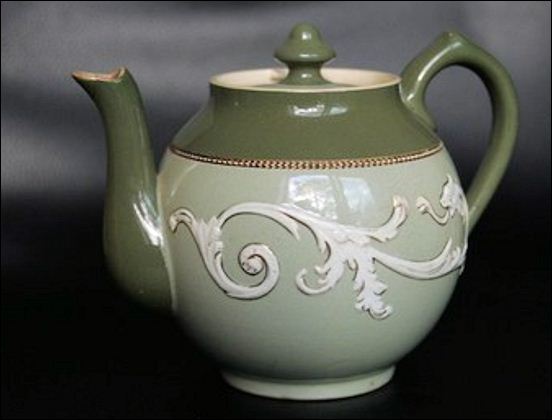 simple tube-lined design Washington Faience teapot |
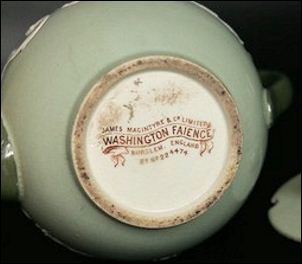 James Macintryre & Co Limited Washington Faience Burslem, England The registration number
224474 shows the pattern was first registered on |
from c.1894 MacIntyre produced a series of designs by Wildig under the name "Washington Faience"
Gesso Faience
The "Gesso Faience" line developed by Harry Barnard who had come
to Macintyre from Doulton's and left them in 1897 for Wedgwood.
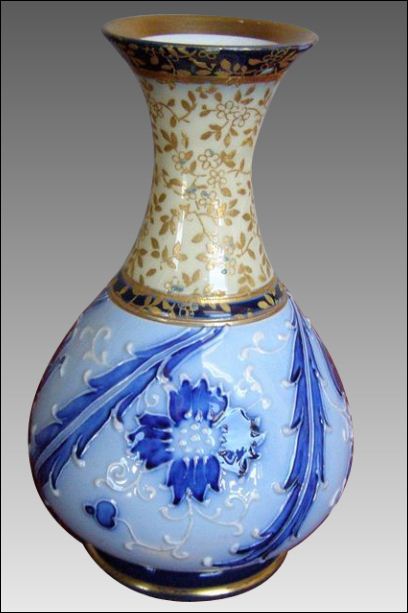 tube-lined vase from the 'Gesso Faience' range |
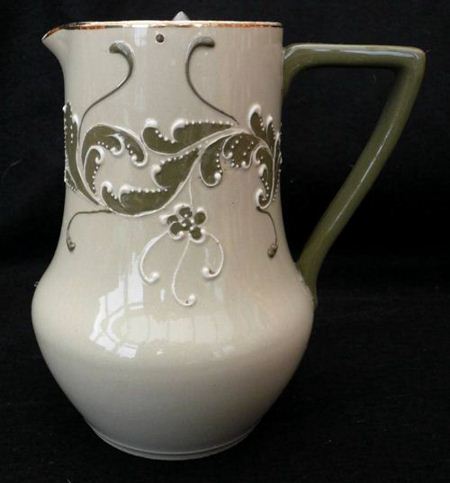 Jug with tube-lined decoration one of the 'Gesso Faience' range |
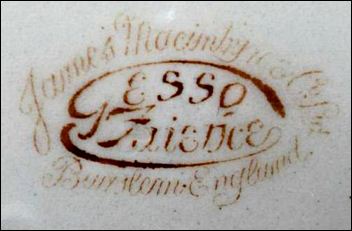
James Macintyre & Co Ltd
Burslem, England
Gesso Faience
c.1894-1928
The "Gesso Faience" line developed by Harry Barnard who had come
to Macintyre from Doulton's and left them in 1897 for Wedgwood.
| Aurelian
Ware William Moorcroft's earliest pieces at Macintyre were the Aurelian Ware which were partly decorated with transfers and partly painted by hand. Moorcroft developed highly lustred glazes and used oriental shapes and decorations. |
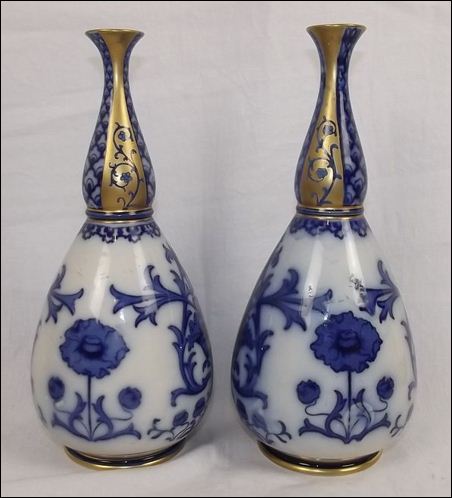
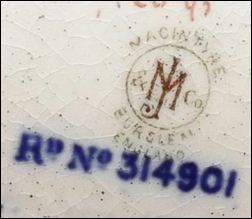
a pair of vases in Aurelian Ware
the registration number 314901 dates to
1898
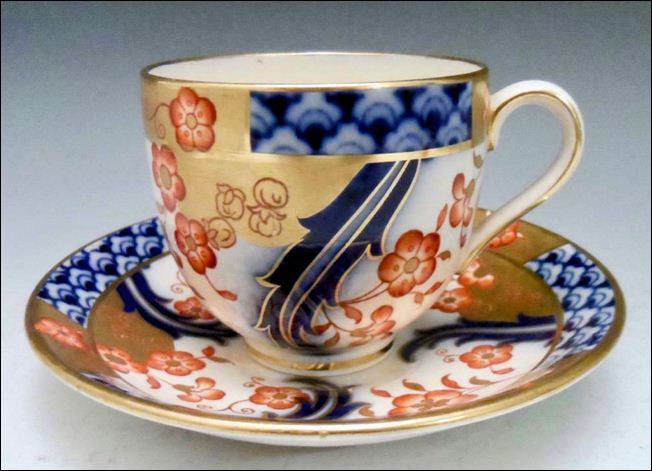
Aurelian Ware cup & saucer
this later decoration shows the
development of the Aurelian style
| Florian
Ware William Moorcroft evolved the Aurelian Ware style into the Florian Ware designs with tubelining, heavy slip and translucent glaze to produce brilliance of colour. Moorcroft examined each item produced and he started to mark each piece with his own signature or initials. Later Green and Gold Florian designs represent a combination of the earlier and later concepts. There were many variations on the Florian theme from the original flower patterns to scenic designs. |
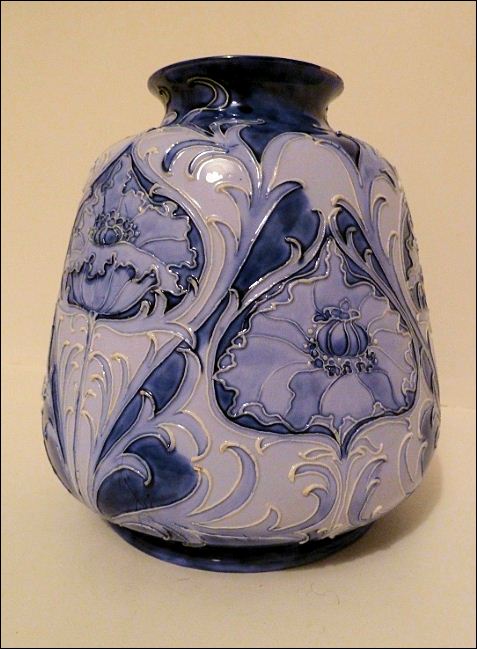 Florian Ware vase |
the registration number 326471
shows that the pattern was registered on the |
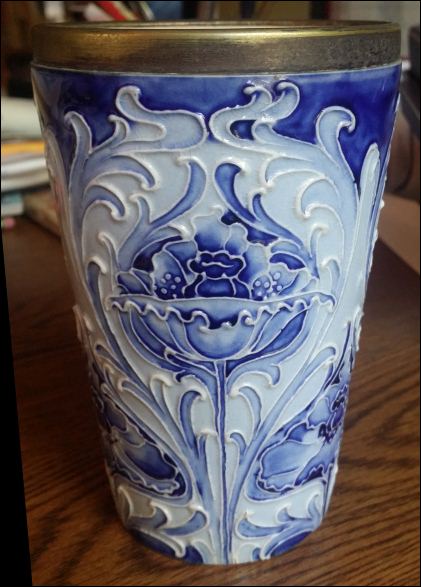 Florian Ware vase with metal rim |
with William Moorcroft signed initials |
|
Marks used on ware for identification: Industrial ware and architectural fittings such as door furniture, finger-plates, draw-knobs, mortars & pestles were unmarked. Early domestic ware - bowls, jugs, salt & pepper shakers had an impressed mark (c.1854-67). Around 1865 Macintyre took his Commercial Manager, Mr. Thomas Hulme, and his son-in-law, Mr. William Woodall into partnership with him and the style was changed to Macintyre & Co. The mark was the familiar circle with JM & Co inside. Around 1894 the business was incorporated as a Limited Company and so any marks with "Ltd" or "Ld" are after 1894. However Macintyre continued to extensively use the "& Co" mark without "Ltd" |
MACINTYRE
c.1854-67
J MACINTYRE
c.1854-67
J M & Co
c.1867+
J MACINTYRE & Co
c.1867+
J MACINTYRE & Co
Ltd
c.1894+
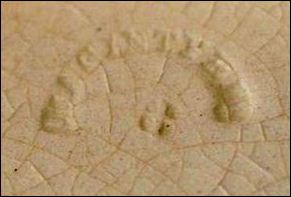
Impressed mark
MACINTYRE
c.1854-67
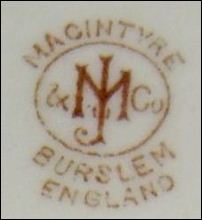
Macintyre
JM & Co
BURSLEM
ENGLAND
typical mark used from c.1867
and continued throught
the whole period of operation
Washington Works
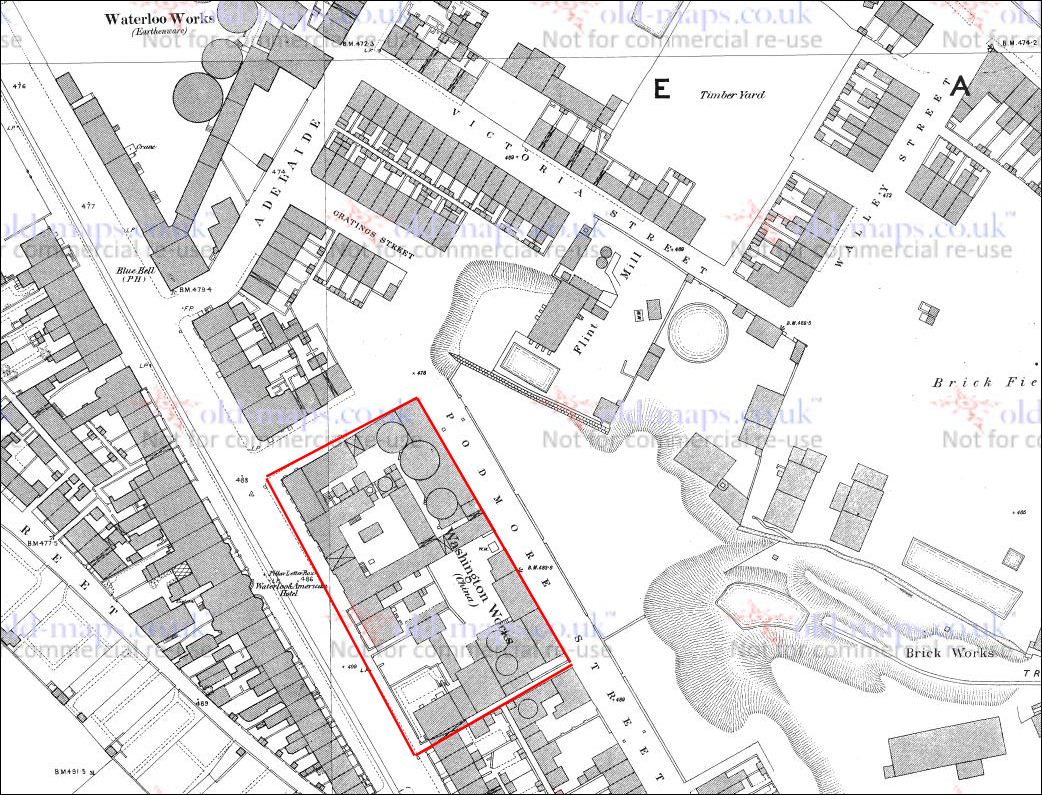
1879 map showing the Washington
Works on Waterloo Road, Burslem
courtesy: old-maps.co.uk
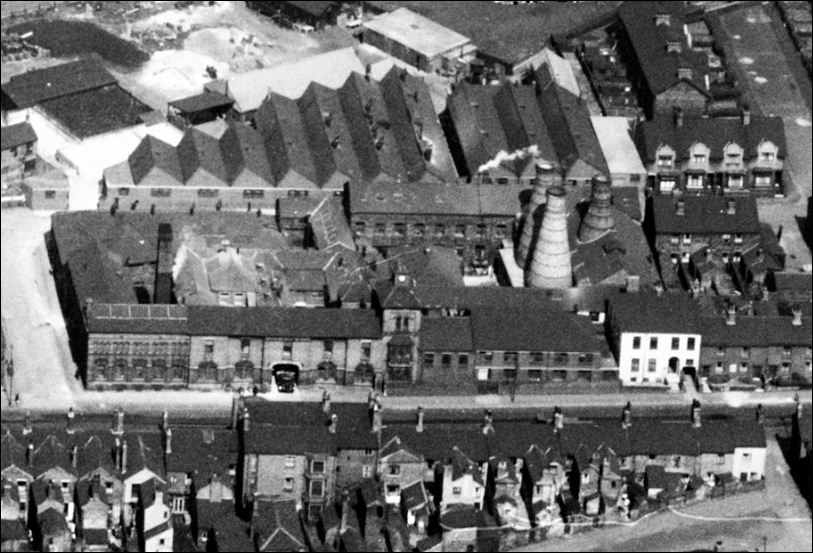
the Washington Works of James
Macintyre & Co. Ltd. in 1946
the street to the left of the works in Macintyre Street
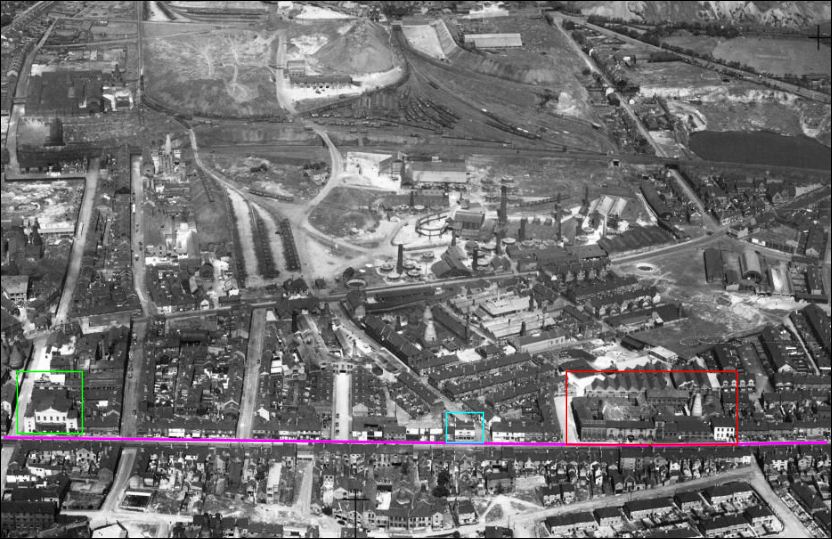
Waterloo Road, Burslem (puple line) in the foreground
Red
box - Washington Works
Blue box - Blue Bell Inn
Green box - former Bethel Methodist
Church
in the centre and backround is the Sneyd Colliery & Brick Works
photo courtesy: Britain from Above
Questions, comments, contributions? email: Steve Birks